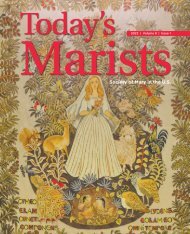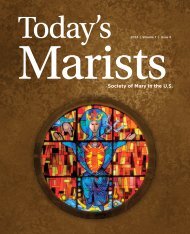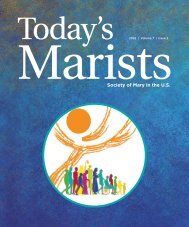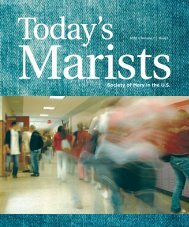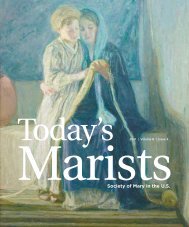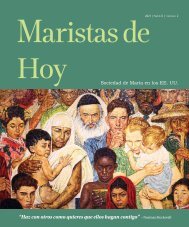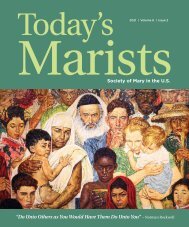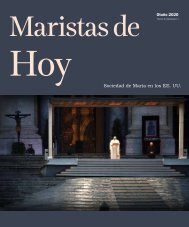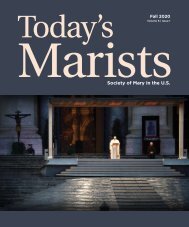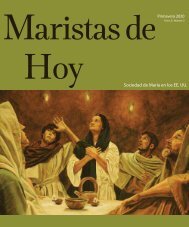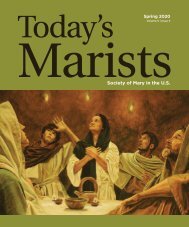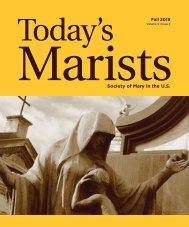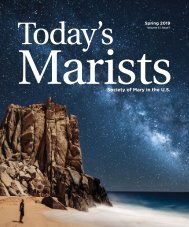Today's Marists 2024 Volume 8, Issue 2
Create successful ePaper yourself
Turn your PDF publications into a flip-book with our unique Google optimized e-Paper software.
One Hundred Mass Intentions.<br />
Who is My Neighbor?<br />
A Marist Priest Reflecting on Mission in Mexico<br />
by Fr. Francois Chauvet, SM, Marist Community, Paris, France<br />
I had just been appointed as vicar to the Marist parish in Mexico<br />
City, Mexico where we felt we could do more. Luckily, a letter came<br />
from Sister Diana (Misioneras Guadalupanas del Espíritu Santo),<br />
inviting the <strong>Marists</strong> to lead the services during Holy Week among the<br />
indigenous communities of Tepezintla and Tonalixco, where she had<br />
been for several years. Sr. Diana and I met when she was a student<br />
leading a youth group in Mexico City and discovered her vocation to<br />
religious life.<br />
A Marist deacon due to be ordained priest that year and I took the<br />
long bus ride to Zacatlan and from there, two more hours to where Sr.<br />
Diana was waiting. The next day we walked three hours to Tepezintla.<br />
On the way we receive our first Nahuatl language lesson: “Kema -<br />
yes, amo - no!”<br />
That afternoon I celebrated Mass in Tepezintla and discovered a<br />
world and an approach to God that were totally unbeknown to me.<br />
Arriving at the sacristy, I saw a line of about twenty people waiting.<br />
Apparently, word had spread that the padrecito (little father) had<br />
arrived, and people had come to present their Mass intentions. Sr.<br />
Diana instructed me to sit at the table and welcome each person.<br />
They greeted me with a light bow and a gentle, imperceptible smile.<br />
They looked tired as if they had walked quite far. The following day<br />
I realized that most of the people do not live in the village, but in<br />
houses scattered across the countryside, and walking is a way of life<br />
here. They seem to have come straight from the fields, still carrying<br />
tools. I noticed their used clothes, too long or too short, and sandals<br />
that scarcely covered their bare feet, offering almost no defense<br />
against the cold. Nothing like the jacket and boots that I brought! I<br />
saw faces burned by the weather and calloused hands hard as metal.<br />
I saw the fatigue, the weight of the day, the journey of the life they<br />
have spent tilling the land or working in the city, and here they were,<br />
to offer that life they carried on their backs like a cross, that life of<br />
effort, work, of struggle, to “ask for their little Mass.”<br />
An older lady approached and took from the folds of her clothes a<br />
small plastic bag, from which she reverently removed a folded sheet<br />
of paper that she handed to me. I read the large, scribbled words that<br />
read something like:<br />
“Santo Padrecito (literally, “holy little father”), very good afternoon,<br />
I greet you with respect and I ask you to please celebrate the holy<br />
Mass today for my animals, my chickens, my corn, the harvest,<br />
for my husband who is in Mexico City, for my children who have<br />
not returned, for the eternal rest of my mother Ofelia, for my sister<br />
Anastasia, for Juan, for Isidoro (and twenty other names). I thank you<br />
and God bless you.”<br />
It was written in big round letters, like the ones we learned in grade<br />
school. The lady smiled at me and walked away, and another person<br />
approached. The short, solemn ceremony of handing over the sheet<br />
of paper to me repeated twenty or thirty times.<br />
“Each day we have to decide<br />
whether to be Good Samaritans or<br />
indifferent bystanders.” (Fratelli Tutti, 69)<br />
Sr. Diana explained that I must take all the papers to Mass and put<br />
them on the altar, where everyone can see them. During the prayers<br />
of the faithful, I had to read all the names from those papers. Sr.<br />
Diana said firmly, “it is not enough to mention some of them, you<br />
must read ALL of them. They need to hear the names of their loved<br />
ones at Mass.”<br />
After Mass, to my surprise the people lined up to collect their papers.<br />
To each one I asked; “what are the names of your difuntitos (your<br />
departed loved ones)?” Sr. Diana also explained that I was to “give a<br />
piece of good advice” and bless them. Each person handed me a fivepeso<br />
coin (that is the equivalent of a day’s salary!), picked up one’s<br />
paper, carefully refolded it, and put it back into his/her pocket with<br />
infinite respect and care, as a treasure of great value. This begged the<br />
question: Why do they keep that piece of paper so carefully? Why do<br />
they always carry it with them? Why is it so important? It took a while<br />
for me to understand: Many of our indigenous brothers and sisters,<br />
do not know how to read or write. Women in general do not speak<br />
Spanish. They are unable to read what exactly is on their paper.<br />
I learned that one day prior to my coming to say Mass, some kind<br />
person helped them. A teacher, someone “who knew how to read<br />
and write,” a “person of reason,” wrote down their Mass intentions,<br />
the names of the people they loved. So yes, the paper was a treasure<br />
they carried close to their hearts. Someone GAVE them an infinitely<br />
valuable treasure which bears their loved one’s names. On that<br />
paper are their animals, their harvest, their pains, their absences, the<br />
emptiness that centuries-old poverty and deprivation has etched into<br />
the deepest part of their being ... and so many other things that they<br />
could not write down.<br />
No one knows when a padrecito will come again. No one knows<br />
when Mass will be celebrated again - a Mass they may not<br />
understand much about, but a Mass where someone who “knows”<br />
talks about them to God, someone who puts their names on the<br />
altar; their little animals, their harvest, their hope for a better future<br />
that most likely may never come. However, this day they are happy<br />
because “the little father said my little Mass.”<br />
To me this ritual before Mass is already Mass. It is a Mass that<br />
precedes the Mass. It is a prayer, an offering, the sacrifice of hours of<br />
walking from a hamlet or village. It is the sacrifice offered for others,<br />
for those no longer here, but who are not completely gone, those who<br />
are no longer “out there” but are still alive “in here.”<br />
It is also, and this is no small thing, the sacrifice of a whole day’s<br />
salary. That money is not free, it did not fall from the sky. It is the<br />
continued on page 11<br />
<strong>Volume</strong> 8 | <strong>Issue</strong> 2 9



